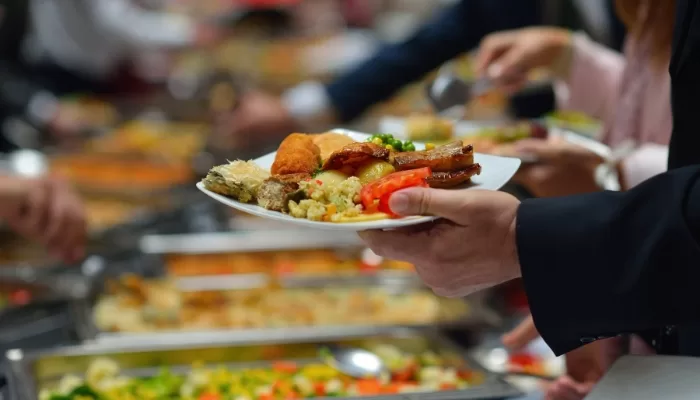Food & Beverage
Why Exclusive Food Collaborations Are the Hottest Trend in Marketing

- Limited-edition food brand collaborations thrive on exclusivity and FOMO, driving consumer demand through unique, time-limited offerings.
- These partnerships allow brands to innovate, cross-promote, and reach wider audiences, often leading to viral success on social media.
- The trend reflects the evolving food industry, with future collaborations likely to explore even more creative and sustainable avenues.
In recent years, the food industry has seen a surge in limited-edition collaborations with well-known brands. From odd pairings like KFC and Crocs to delicious duos like Dunkin’ Donuts and Oreo, these collaborations have captivated people all around the world. But what’s driving this expanding trend? Let’s look at the fundamental drivers fueling the emergence of limited-edition food brand collaborations, along with real-world examples.
The Power of Exclusivity and FOMO
One of the key reasons for limited-edition collaborations’ popularity is the great appeal of exclusivity. When a product is only accessible for a limited time, it triggers consumers’ fear of missing out (FOMO). This sense of urgency motivates individuals to act swiftly, which often results in things selling out in record time.
Consider the relationship between KFC and Crocs, for instance. This unusual collaboration resulted in a limited-edition pair of clogs resembling the classic KFC bucket, complete with chicken-scented charms. The novelty and exclusivity of the product made it a viral hit, with the clogs selling out almost instantly.
Innovation and Experimentation in The Kitchen
Collaborations enable brands to experiment with new flavors, ingredients, and culinary techniques that they might not have tried on their own. By combining their distinct capabilities, brands may develop creative goods that surprise and excite customers.
Consider the Heinz and Kraft Mac & Cheese cooperation, which resulted in a limited-edition “Heinz Ketchup-Flavored Mac & Cheese.” This creative and unexpected flavor combination prompted heated debate online, but it also drew major attention and increased visibility for both brands. Even if some customers were dubious, the collaboration met its goal of sticking out in a crowded market.
Cross-Promotion and Brand Synergy
Limited-edition partnerships provide effective cross-promotion and brand synergy. When two brands collaborate, they can use each other’s client base and marketing channels to reach a larger audience than they would independently. This collaboration not only raises brand recognition but also boosts sales for both parties involved.
The recent collaboration between OREO and Coca-Cola is an excellent example. The two legendary companies collaborated to produce the OREO Coca-Cola Sandwich Cookie and Coca-Cola OREO Zero Sugar. These products merged both brands’ iconic flavors, providing consumers with a unique experience. The relationship was bolstered by a merchandising tie-in with Forever 21, which includes garments and accessories inspired by the partnership.
Social Media Buzz and Customer Engagement
In today’s digital world, limited-edition collaborations rely heavily on social media to be successful. Consumers enjoy sharing their experiences with these exclusive products online, which generates excitement and free advertising for the participating firms. This type of organic, word-of-mouth marketing may be quite effective, frequently resulting in things selling out faster than expected.
For example, the Dunkin’ Donuts x Oreo collaboration, which featured Oreo-flavored coffee and donuts, immediately gained popularity on social media. Fans posted images and reviews, inspiring even more people to try the limited-edition goodies.
Impact on the Food Industry
The rise in limited-edition partnerships is more than a transitory fad; it reflects the changing food market. These collaborations provide consumers more options and introduce them to new flavors that they might not have tried otherwise. Collaborations enable established businesses to stay relevant and engage with a new generation of consumers. They can rebrand themselves and keep their market share by collaborating with fashionable or developing businesses.
The Future of Limited Edition Food Brand Collaborations
As the food sector evolves, we may expect to see more innovative and surprising alliances. Brands may consider collaborating with fashion labels, gaming firms, or even celebrities to push the limits of what is possible in the culinary realm. As customers become more aware of the environmental and social consequences of their purchases, there is likely to be a greater emphasis on sustainability and ethical collaborations.
To conclude the rise of limited-edition food brand collaborations demonstrates the power of creativity, exclusivity, and cross-promotion. These relationships provide brands with a unique method to communicate with their customers, generate sales, and stay ahead of the competition. As we look ahead, it’s apparent that limited-edition collaborations will continue to have a huge impact on the food business. So, keep an eye out for the next great collaboration—you will not want to miss it!






















































